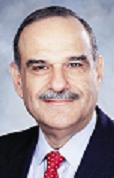New Orleans DA Guilty of Bias…
New Orleans' first black district attorney discriminated against 43 whites when he fired them en masse and replaced them with blacks upon taking office in 2003, a federal jury decided Wednesday. The jury awarded the employees about $1.8 million in back pay and damages.
The jury — made up of eight whites and two blacks — returned the unanimous verdict in the third day of deliberations in the racial discrimination case against District Attorney Eddie Jordan.
Jordan acknowledged he wanted to make the office more reflective of the city's racial makeup, but denied he fired whites just because they are white. In fact, he said, he did not know the race of the people fired.
Under U.S. District Judge Stanwood Duval's instructions, jurors had to find Jordan liable if they concluded the firings were racially motivated. The law bars the mass firing of a specific group, even if the intent is to create diversity.
Jordan, stoic in the courtroom as the verdict was read, told reporters he was disappointed and will appeal.
"We thought the facts as well as the law favored us. I still maintain that I did not use race as a factor in my hiring practices," he said.
Jordan said the District Attorney's Office, which is liable for the award, cannot afford to pay the verdict. It was not immediately clear whether state or city, or both, would ultimately be responsible for paying the money.
Plaintiffs' attorney Clement Donelon said he was elated. "The plaintiffs' civil rights, every single, solitary one of them, were violated," he said.
"You may be able to fire people, but don't do it because of race. That goes both ways," the attorney said.
Clemens Herbert, a former investigator who among those fired, said: "What I wanted was a win. Money was not the issue. He was trying to disguise racial discrimination through politics, and the jury saw through it."




